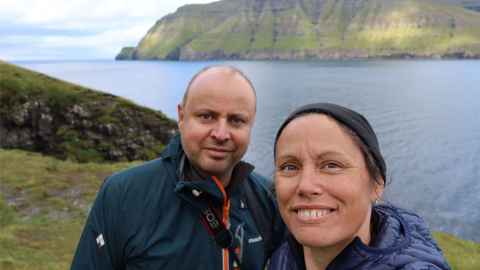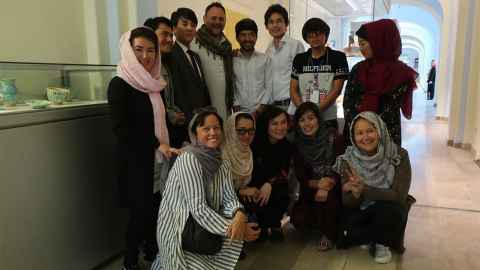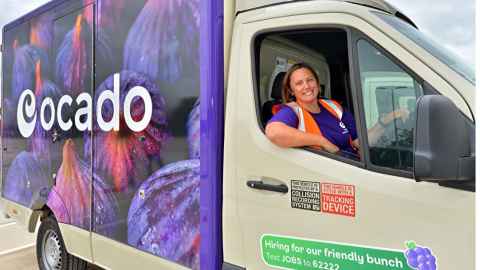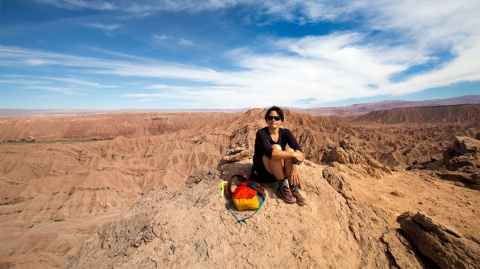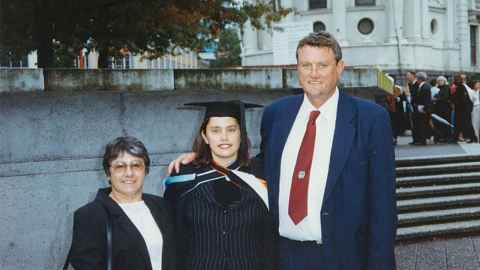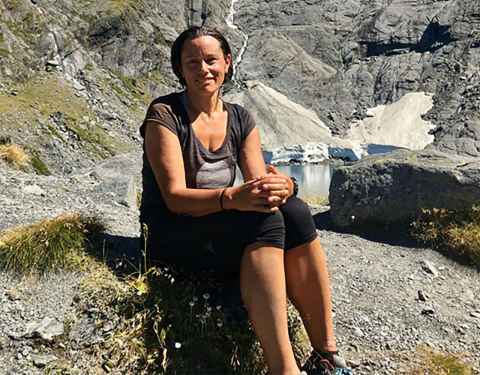Mel Smith: Māori CEO in the UK who keeps it real
13 May 2022
Melanie Smith breaks the mould. It’s rare to find a female chief executive in London, let alone one who is Māori.
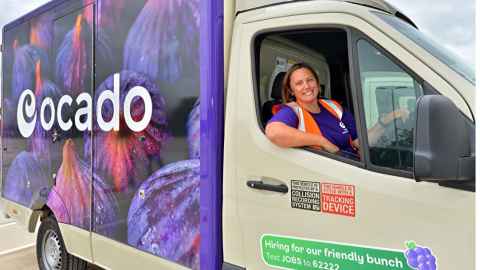
During the peak of the Delta outbreak in the UK in 2020, you might have found alumna Melanie (Mel) Smith, CEO of Ocado Retail, an innovative online UK supermarket, sleeping in her beat-up van in an Ocado warehouse carpark. She wanted to be up on site early to help her team.
“Yes, I did sleep in the van. I really like chatting with our delivery drivers, too. They’re such good people, so I actually enjoyed it.”
Established in 2000 as the UK’s first online grocery store, Ocado doesn’t have physical stores – just massive warehouses with thousands of robots bringing food to human packers for delivery.
Aside from the chat, Mel wanted to be at the coalface to support delivery continuity to Ocado Retail’s fast-growing database of online shoppers.
Then there was the time she arrived for an appointment in her panel van with a mattress in the back.
“I had a meeting with a manager, so parked in the VIP space. Someone asked, ‘Are you sure you are in the right place?’”
She was. “I’m really sorry,” she said. “I’m your VIP.”
You can tell it gave her joy.
Mel tells entertaining tales quickly. She’s the one you want to sit next to at dinner parties. There are no affectations adopted from living in London for 20 years.
She’s inspirational in many ways – female CEOs in the UK are rare. She’s also Māori (Ngāpuhi).
So how did she get such a job?
Let’s go back. Mel was at Howick College when her parents, Francie and Dennis, moved to Kawakawa in Northland.
“I went up north for six days, then told them I was going home.”
She headed back to Howick College, staying with friends.
“I was lucky. I had great teachers at Howick such as Judy O’Reilly, who I’m still in contact with. My parents were big on education – my dad was a crazy entrepreneur with a lot of drive. Even though he was wasn’t an academic, he was smart. My mum is incredibly disciplined.”
Mel completed a conjoint BCom/LLB at the University of Auckland, graduating in 1997, and then a MBA at the Kellogg School of Management in Illinois while she was working at global management consultant McKinsey & Company, where she ended up a partner. More recently, she was managing director at Smith Hebert, a boutique advisory and investment firm focused on the consumer goods sector. She has had many influential jobs and worked as a consultant.
I sat in front of these incredibly posh people for six months, negotiating to buy half the business off them, which was a terrifying experience. I just problem-solved my way through it.
“I came out of retirement in 2017 to work as strategy director at M&S to run their bank and help them figure out what to do when they were looking to acquire Ocado Group’s retail operation, which they now half own. I was a key person in that negotiation.
“I sat in front of these incredibly posh people for six months, negotiating to buy half the business off them, which was a terrifying experience. I just problem-solved my way through it.”
Once the deal was done, Mel wondered who would lead Ocado Retail. “My investment banker said, ‘You should go for the job’.”
Mel thought that wouldn’t be possible.
“He said, ‘Well, they won’t give it to you if you don’t ask for it’. I wondered if I would even make a good CEO. He handed me a list of all the CEOs in the UK. I decided I could.”
He’s now her chief financial officer.
Mel had to wait nine months before her appointment was confirmed and also had to bite her tongue in the second interview when someone said, “Well, you seem like a smart girl”.
She started the role in August 2019 and the UK went into lockdown in March 2020. She worked every single day of 2020 until Boxing Day, visiting warehouses, communicating with delivery drivers and connecting with government ministers. She was made a CBE in the UK 2021 New Year’s Honours, for services to retail and the food-supply chains during Covid. She was also an inaugural recipient of a special recognition award from the UK Friends of the University of Auckland.
But if she thought 2020 was hard, 2021 was harder.
“Trading through a crisis was easier. Everyone lived on adrenalin. But in 2021 we had Brexit, supply-chain challenges and didn’t have enough labour. We also had a fire in a warehouse.
“Personally, it was super crappy. I was going through early menopause and was exhausted and feeling crazy. I finally got on hormone replacement therapy and started to feel better. Then my dad died suddenly. I didn’t get to his funeral because I was stuck in MIQ ; I had to watch it on Zoom.
"Then I got back from New Zealand, and my husband Stephane was diagnosed with prostate cancer. He had surgery and is fine now. And one of our two cats died. Yip, 2021 sucked.”
I say to people to ‘bring your best self’. ‘But if your best self is a racist, homophobic dickhead, then don’t bring that one’.
But that was then, this is 2022. She’s back on track – healthy, enthusiastic, energetic and ready for whatever the next challenge is, and for more travel.
In 2019, Mel ticked off what had become an obsessive goal – to visit every UN country in the world, defined as the 193 UN member nations. She added another four locations for good measure – Taiwan, Kosovo, Palestine and the Vatican.
“It would have driven me nuts if I’d been stranded on 192 countries before lockdown!”
Her preferred way to see places is to hike, with Stephane, with a friend or alone.
“This year I’m taking Stephane hiking in the Hindu Kush in Pakistan. We’re also going on a road trip from Baghdad to Basra in Iraq. As well, I’m walking across Bosnia and I’m taking Stephane to the island of Socotra, off Yemen. These are his holidays!”
The wanderlust can be a challenge.
“I can’t take more than a week at a time, and I go away with a satellite device. I was away in 2021 when I got a satellite text in the mountains saying, ‘One of your warehouses is on fire’.
“So I’m texting the CFO and giving him the coordinates of the nearest road so someone could come and pick me up and drive me to the airport.”
Truth is, even though she loves her job, Mel doesn’t have to work at all.
“I don’t need a lot of money. I don’t have kids. I happily live on very little and could live in my van for the rest of my life.
“Most of my colleagues in the UK have kids in private schools and bills to pay and that feels like a much more stressful existence than mine. If I lost my job tomorrow, I’d be fine.”
She say that brings freedom.
“I’m always going to do what I think is right. I’d rather get fired for doing what I think is right than doing what someone told me to do that I felt was wrong.”
Ocado is an organisation that attracts a diverse range of people, and she says it helps to be Māori in this regard, and gives her the opportunity to be a role model for Indigenous women in business.
“Ocado Retail has an inclusive environment. It doesn’t matter if you’re the posh kid who went to Eton or a refugee from Afghanistan, I want you to feel you can be yourself, because that will enable you to do your best work. I say to people to ‘bring your best self’. ‘But if your best self is a racist, homophobic dickhead, then don’t bring that one’,” she laughs.
Mel and Stephane enjoy the theatre and dance and Mel is on the board of dance theatre Sadler’s Wells, another inroad to improving diversity outside work.
“What I like about Sadler’s is they are trying to bring diversity into their productions so it’s not just lots of posh white ballet dancers. I know the CEO and we have a regular ‘fight’ because when I first got on the board, I said, ‘Maybe you should think about putting on a Māori dance performance’, and he laughed out loud. I said, ‘What? We have African, Jamaican, people from Senegal. I’m not having you laughing!’ I’m still working on him.”
I’m always going to do what I think is right. I’d rather get fired for doing what I think is right than doing what someone told me to do that I felt was wrong.
She’s a woman of influence and wants other young Māori women to be the same.
“I hope this comes across OK, but I meet all these talented young Māori women who say, ‘I’m going to work in Māori business’.
“And I say, ‘Well, that’s noble, but why don’t you want to be the CEO of Google? Or Microsoft? Why are you capping your aspirations? I would like you to go and run the world, so get out there.”
She’s hoping to help make that happen by funding the Mokaraka Māori Women in Business Scholarship through the Business School. But ‘snowflakes’ best not apply. And she isn’t big on shirkers.
“I’m pretty ruthless. You have to get good grades. You also have to earn your own money because I’m earning money to give you money, so I expect you to have a job during the year.
“I feel an obligation to all the people who supported me – and believe it’s important to help the next generation. But if you take money off me, one of the criteria is you have to pay it forward at some point … if you can.”
Mel knows the University is a great place to build connections for life. Through Te Rākau Ture, the Māori Law Students’ Association, she made lifelong friendships.
“Te Rākau Ture crew are there if I need them, to this day. I am godmother to the youngest of Amokura Kawharu, who is president of the Law Commission. I’m good friends with Khylie Quince, Dean of the AUT Law School – she’s amazing, she’s fierce. And also Teanau Tuiono, a Green Party MP from Palmerston North. They helped me through uni.”
Artworks by Tracey Tawhiao, also a Law School alumna, are on the walls of her London home.
Mel says although she is connected to Aotearoa New Zealand, there are gaps.
“When I came to London, my reo wasn’t great. I’ve learned, but I’m not fantastic. My knowledge of tikanga isn’t great, either.
“But 99 percent of my whānau over here, Ngāti Rānana (the London tribe) say, ‘Don’t you worry about that. You’re doing your own thing and you look after us and it’s okay’. I’m not the perfect Māori and no one expects me to be the perfect Maori.”
The imperfect Māori isn’t planning to come home soon, even though she acknowledges that might be expected of her.
“I know I would be a better role model at home, but half of me thinks I’m not really a role model. I’m just someone who gets up and goes to work every day.”
Story by Denise Montgomery
This feature will appear in Ingenio, Autumn 2022 edition.
Email ingenio@auckland.ac.nz
Mel Smith has visited almost 200 countries. See her travel blog: onlymyfootprints.com

